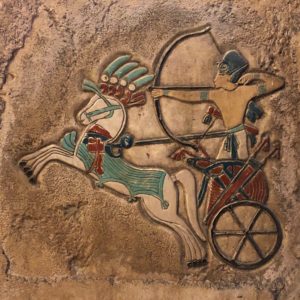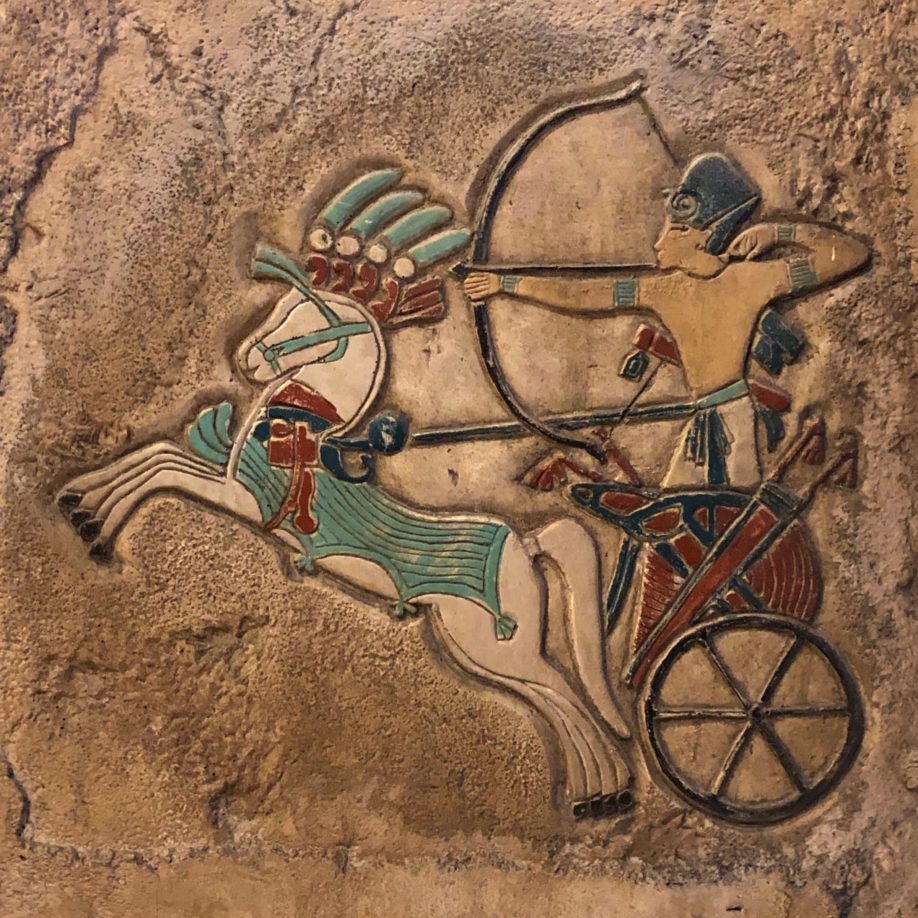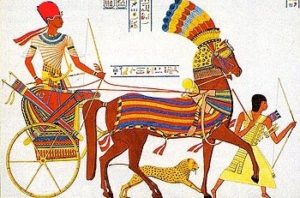 Did you realize it was the Hyksos–the foreigners who ruled Egypt from around 1800-1550 B.C.–who brought horses to Egypt? Until I began research on my first biblical novel in 2001, I thought Egypt only had camels.
Did you realize it was the Hyksos–the foreigners who ruled Egypt from around 1800-1550 B.C.–who brought horses to Egypt? Until I began research on my first biblical novel in 2001, I thought Egypt only had camels.
That, too, is false. Egyptians used donkeys because they were more sure-footed on the banks of the Nile and easier to manage.
The Bible mentions that Abraham sent camels with his servant to Padan-Aram in order to find a wife for Isaac (18th Century BC). However, history makes no mention of domesticated camels in Egypt until the Persian invasion in the 6th-7th Century BC. Crazy, huh?
Truth Over “Facts”
If you’ve read my books, you know I begin with the unalterable TRUTH of God’s Word as my foundation. The Bible’s words are non-negotiable and unchanged in my stories.
Historical records, however, often conflict with each other and are sometimes difficult to determine or verify their accuracy. I read LOTS of resources–both Christian and secular scholars–to get a broad view of prevailing thought. Then I build a story, holding it together with creative fiction.
Sometimes, as is the case with what the Hyksos contributed to the Egyptian ancient culture, ALL HISTORIANS AGREED! As much as the Egyptians eventually came to despise their foreign rulers . . . they certainly benefited from the toys the Hyksos left behind.
There was even a little heart lesson in there as I pondered this concept. Maybe you’ll relate to it too…
Big Boy Toys
The Hyksos are credited with introducing three main WAR “toys” to Egypt when they migrated from Canaan:
- Horses
- Chariots
- Composite Bows with Bronze-Tipped Arrows
Archaeologists date their findings by the level of dirt in which they discover remains. While digging in modern-day Tell el-Dab’a, they reached the Second Intermediate Period (SIP – C. 1800-1550BC) level and discovered the remains of horses, chariots, and composite bows.
Most archaeologists believe the Amu (Amorite and/or Semitic tribes), who were later called Hyksos (meaning foreign rulers in Egyptian), were forced from their Canaanite lands during the SIP.
Yet these same archaeologists argue that the horses, chariots, and composite bows were the reason Egypt eventually became the dominant military force of the ancient world. CLICK HERE for a great article on Ancient Egyptian weaponry.
Where Truth and Fiction Collide
Was it a superior military force that pushed the Amu from Canaan? On the contrary, most historians believe it was a wealthy Bedouin tribe, whose growing wealth and livestock caused the Amu migration.
How could a bunch of shepherds push out tribes of people with superior weapons?
My theory is that Abraham, Isaac, and Jacob were those wealthy Bedouins, and it was God’s protection & promise that drove the Amu from Canaan–despite their superior weapons. Here’s why…
(I love when historical research and science affirms Scripture’s Truth. When scholars–who profess no faith in my God–confirm with all their scientific findings what my Bible declares as true, I get super excited!)
Two different kings of the Philistines (their titles were “Abimilech”) came to Abraham and Isaac, asking to make treaties with them because their camps/households had become so vast and their flocks covered so much ground (Gen. 21-26).
Then there’s this little clue at the end of Jacob’s life that tells us he’d even gone to war with an Amorite tribe (the ones displaced from Canaan):
“Then Israel said to Joseph, ‘I am about to die, but God will be with you and take you back to the land of your fathers. And to you I give one more ridge of land than to your brothers, the ridge I took from the Amorites with my sword and my bow.'” Genesis 48:21–22
I hold no academic degrees. I’m not an archaeologist or scholar. But I get really excited when I find connections like that and can write FICTION that seems to flow with both the TRUTH of God’s Word and the FACTS historians uncover.
Why the Toys Matter
So, why didn’t the Amu use those weapons to fight Abraham, Isaac, & Jacob instead of leaving Canaan? There are a variety of reasons, but they all boil down to One: God’s protection & promise.
Let’s look at the root: God’s promise to give the land to Abraham and his descendants. Keep in mind, it took a loooooooong time to get the job done, and none of the original patriarchs lived to see the promise fulfilled. But God had prepared Abram for the wait:
“As the sun was setting, Abram fell into a deep sleep, and a thick and dreadful darkness came over him. Then the Lord said to him, ‘Know for certain that for four hundred years your descendants will be strangers in a country not their own and that they will be enslaved and mistreated there. But I will punish the nation they serve as slaves, and afterward they will come out with great possessions. You, however, will go to your ancestors in peace and be buried at a good old age. In the fourth generation your descendants will come back here, for the sin of the Amorites has not yet reached its full measure.'” Genesis 15:12–16 (emphasis added)
On the Road to His Promise
Did you remember that Abram was told all about the coming suffering EARLY in his journey with God? Before Ishmael. Before Isaac. But sometimes we’d rather focus only on God’s reassurance when His promise includes a hard road to the destination.
To ignore the hard part of His promise means we’ll miss some of His glory. Let’s take a quick look at the ways God proved faithful to Abraham, Isaac, & Jacob amid the Amorites’ horses, chariots, and composite bows:
- God kept Sarah safe while she was in Abimelech’s household by keeping all the Philistine king’s women from bearing children (Gen. 20). Rather than killing Abraham and his household, he asked for prayer and added to Abraham’s wealth.
- God blessed Isaac in that same land–even though he also lied to Abimelech–and his crops produced 100-fold (Gen. 26). When the envious Philistines stopped up his wells and begged him to move away (because he’d become too powerful), he moved to a new place–Beersheba–and made a treaty with a new Philistine king (Abimelech). They dug new wells & tradition says they found SEVEN springs!
- Jacob purchased the second piece of land in Canaan–at Shechem (Gen.33:19). Abraham had purchased the burial cave at Machpelah as the first plot in the promised land (Gen.23:20). After Jacob’s sons murdered every man in Shechem, he feared the other Canaanites would rise up and join forces against them (with those horses, chariots, & composite bows), but . . .
“Then they set out, and the terror of God fell on the towns all around them so that no one pursued them.” Genesis 35:5
Lessons From the Hyksos Toys
Here’s what I’ve learned from both the research and the pondering of both Israel’s history and Egypt’s during the Second Intermediate Period (SIP):
- God never promised to keep His chosen ones free from trouble.
- God’s promises ALWAYS came to pass–but never in the way people expect.
- God protected His chosen ones in all sorts of ways, usually after SIN–theirs, someone else’s, or both–had gotten them into a mess.
- No matter how great the enemy or its weapons, God carries a bigger stick.
Today’s Questions:
- What promises are you holding onto that might also include the hardship you’ve ignored? How can you focus on God’s faithfulness during the tough stuff while you wait for His certain fulfillment?





Comments 6
I don’t tell you often enough, but thank you for your research information. Usually I go back to all these chapters which you investigate and detail us on, and I find new light to the Words I read and re-read. Reading between the lines! Continued blessings… Peggycoffey42@yahoo.com.
Author
I’m so glad you enjoy the research and gain insights that jump out “between the lines.” That’s what I trust the Lord to do with everyone who reads my stuff! Only He can make it matter. 😘
Your research is fascinating and I love how you use it in your books. Great work!
Author
Thank you so much, Alice! I love this part. ❤️
Dear Mesu my novel will be centered on Essenes, a question for you: religion mixed with politics is good or bad theme for a young adult novel with biblical historical setting?
Author
I think it depends on the writing for that level, Luca. Most kids in that age range are in the “logic” phase and are ready for well-thought-out but simple arguments and debate to think through. It could be effective. Blessings!